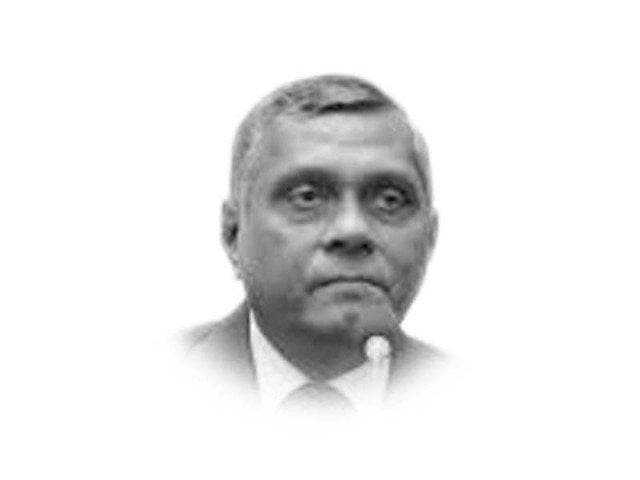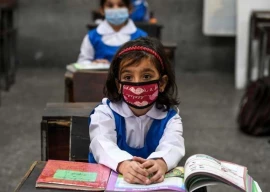
With around 15,000 deaths in the last one year and infection rate of more than 10%, the third wave of Covid-19 is causing lethal implications in Pakistan, particularly in Punjab and K-P. The National Command and Operation Center (NCOC) which acts as a watchdog on pandemic has released shocking figures reflecting 672,931 cases, 605,274 recovered patients and 3,303 critical cases with meager testing of 1,024,737 for 220 million people in the country. Likewise, the Ministry of National Health Services is also active in curbing the pandemic but has its own limitations.
Exactly a year ago, during the first wave of the pandemic in Pakistan, the government had to enforce lockdown all over the country by closing businesses, restaurants, hotels, railways, airlines, and inter-city and inter-provincial transport. As a result, millions of people were stranded and had to wait till June when they were able to gradually travel and other restrictions were removed. In order to help those who lost their jobs and had to suffer because of the closure of their businesses, the government paid billions of rupees as a relief measure. But, that was during the first wave which was not as lethal as the third one. This time, the PM has made it clear that despite the destructive nature of the third wave of Covid-19, it will not be possible to close businesses or provide financial support like it was done during the first wave. That the only way to save people from the raging wave of the pandemic is to wear the face mask and take precautions like maintaining social distance.
One needs to examine a few things critically: why are the people of Pakistan, to a large extent, not careful while dealing with the pandemic crisis? How can the elites of this country take the ownership of an issue which is critical to human lives? Why is it so that neither the government nor the people possess the right kind of skills to manage the crisis? Why did the NCOC and the Ministry of National Health Services fail to arrange sufficient quantum of vaccines? These are the questions that require plausible answers because at stake are the lives of the masses and the national economy. Chinese vaccines, which were provided free of cost, have almost depleted and despite claims made by those holding responsible positions, no serious effort was made to produce vaccine at the local level. As a result, the acute shortage of vaccines along with the alarming rise in the infection rate tends to further augment pandemic crisis.
How to deal with the pandemic’s third wave would require a three-pronged strategy at the state and societal level.
First, a responsible attitude needs to be adopted by maintaining SOPs in the form of keeping adequate social distance and wearing the face mask. Unfortunately, a year has passed but there is no proper awareness nor is there responsibility on the part of people to defeat the deadly virus by bringing a change in their way of life. Paradoxically, like in some other countries, large numbers of people in Pakistan express their lack of faith in the very existence of the virus and call it a conspiracy hatched by multinational pharmaceutical companies to mint money. They also insist that in a population of 220 million, hardly a couple of hundred thousand people have been infected, and that too in an artificial manner with the sole aim to claim foreign funding. Those who deny the existence of the pandemic also blame state authorities for imposing unnecessary restrictions on the movement of people in order to prevent opposition parties to stage rallies and bring out processions. With such a mindset, it becomes very difficult to deal with the pandemic crisis. In view of the ground realities reflecting poverty and social backwardness, it becomes rather impossible to impose a total lockdown or enforce social distancing in areas which are thickly populated.
Second, unless a crisis management mechanism is established on a permanent basis, people will get panicky. When panic, lack of responsibility, planning and non-seriousness determine the mindset of those who matter, Pakistan will continue to face the kind of crisis that is happening today. Arrangements like NCOC can only be effective when there is skill and competence. A year was wasted and no effort was made to produce vaccine locally or arrange sufficient quantum of vaccine doses, ventilators and oxygen beds which could have helped in effectively dealing with the third wave of the pandemic. Now, the situation on the ground is dangerous as even children are vulnerable to Covid-19 and they are infecting their elders. There are now 28 hotspots in different cities of Pakistan where the infection rate is more than 8% and the government is enforcing lockdown from April 1 for around two weeks. As a result, one fears a humanitarian crisis, particularly in Punjab, K-P and Islamabad, if the pandemic becomes deadlier.
Third, the political tug of war between the government and the opposition PDM and also within the PDM between reflects a total indifference on the part of our political class to formulate a joint strategy to deal with the third wave of the pandemic. With this indifference to the crisis, how can one blame others for the non-availability of a vaccine, ventilators and oxygen beds? Political parties, whether in the government or in the opposition, are least interested in focusing on how to effectively deal with the third wave that is causing havoc in major cities and towns of Pakistan. For them power politics and expediency seem to be more important than the lives of the people of Pakistan. In most cases, political parties are themselves least interested in complying with social distancing and asking their supporters to wear the face mask in various gatherings. Recently, a public meeting of the Jamaat-e-Islami was held in Liaquat Bagh Rawalpindi, in sheer disregard to the basic Covid prevention requirements. When the local district administration served a notice on the Jamaat, they pointed out that a while ago the PTI was allowed to hold a public meeting near the same place. It is yet to be seen whether or not the restrictions ordered by the NCOC in 28 cities with hotspots are taken seriously by people. The Deputy Commissioner of Islamabad the other day visited Sunday bazaar and other places where he reprimanded people for not wearing the face mask and maintaining necessary social distance. Some of the buyers were fined, but the absence of stricter measures also caused a surge in positive cases.
In the light of these facts, one hardly sees the likelihood of a change in the mindset of a vast majority of people in our country who continue to doubt the very existence of the coronavirus and call it a fraud or a conspiracy. It thus seems impossible for us to deal with the pandemic that rages on and on.
Published in The Express Tribune, April 4th, 2021.
Like Opinion & Editorial on Facebook, follow @ETOpEd on Twitter to receive all updates on all our daily pieces.

1721390241-0/BeFunky-collage-(20)1721390241-0-405x300.webp)








1726474081-0/Express-Tribune-Web-(1)1726474081-0-270x192.webp)






COMMENTS
Comments are moderated and generally will be posted if they are on-topic and not abusive.
For more information, please see our Comments FAQ